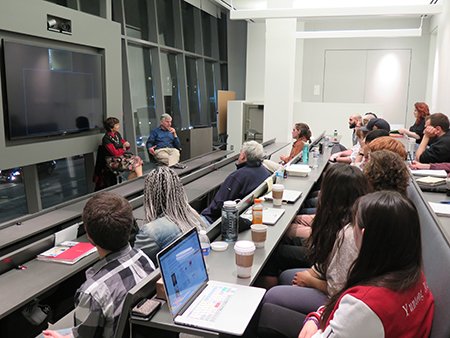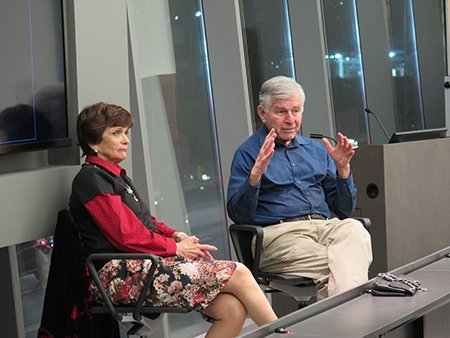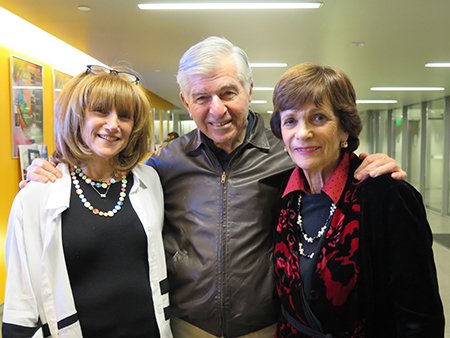Michael Dukakis Speaks at ELA
What’s it like to run for president? Few people can answer that question. Michael Dukakis is one of them.
“The last thing you want to be, folks, is the frontrunner because everyone is going to come after you,” Dukakis said, while speaking to a class at Emerson College Los Angeles.
The former Massachusetts governor and 1988 Democratic presidential nominee spoke on February 4 in faculty member Iris Burnett’s 2016 Presidential Campaign and Election Coverage class about his experiences running for president, lessons learned, and thoughts on this year’s presidential election. His wife, Kitty, joined him during the discussion to share her thoughts on campaigning.

Kitty and Michael Dukakis speak to ELA students.
Dukakis was initially reluctant to run for president, having recently won reelection as governor of Massachusetts in 1986. Dukakis said he never gave running for president a thought, but his family was more enthusiastic about it. He spent a year focusing on his governorship of Massachusetts before spending three months talking with everyday Americans and deciding that it might not be a crazy idea after all.
“I never would have done it if just one of our kids was still in high school,” said Dukakis, who valued family time so much that he and his wife followed two rules: home for dinner at 6 o’clock and no politics on Sundays.
“They knew they had a certain power over him,” added Kitty, referring to the couple’s three children.
Dukakis finished third in the Iowa caucuses, first in the New Hampshire primary, and won six primaries on Super Tuesday, eventually emerging as a frontrunner and winning the Democratic nomination. How? It took a lot of hard work, Dukakis said. At the time, there was no Internet to use as a fundraising tool and no cell phones. Not that having a smartphone would have mattered because he “can’t stand that thing.”
“He doesn’t carry a cell phone [today],” said Kitty. “This is a huge contention of mine.”

During the presidential election against then–Vice President George H.W. Bush, Dukakis said he made two huge mistakes. The first was not organizing every precinct in the country and the second was not having a strategy for combatting political attacks.
“You can’t just sit around and do nothing,” said Dukakis, who wanted to run a positive campaign. “You have to have a strategy for dealing with attacks and doing it effectively.”
The class, in which 22 students are enrolled, uses the 2016 presidential campaign as its foundation and offers a “soup-to-nuts” approach to the art of presidential politics. Burnett has plans to bring in several guest speakers over the next few months to talk with her students.
Throughout the discussion, Dukakis shared his thoughts on the current slate of presidential candidates. He called Senator Ted Cruz “insane” and is not a huge fan of Senator Marcio Rubio, who he says “dances around [the issues].” He said one reason why white, working males are voting for Donald Trump is “because we’re not talking to them.” As for the Democratic Party, he said its biggest problem is failing to effectively articulate its policies.
“You’ve got to articulate what you’re trying to do in a way that connects with people,” said Dukakis. “You’ve got to hammer it.”

Faculty member Iris Burnett said she invited Michael and Kitty Dukakis to her class so that they could understand why a person chooses to run for president and what it takes.
At the end of the evening, Dukakis encouraged students to enter into public service and offered them two tips. First, plan to live moderately. Second, have a good but conventional private life (in other words, no scandals).
“I hope you will think about public service in whatever way it makes sense to you,” said Dukakis. “To me, there’s nothing like it.”
Elliott Conway ’16 was one of the students listening to Dukakis share personal stories, which he called “fascinating.” Conway said he hadn’t originally intended to take the class, but it’s helped him become more interested in the presidential campaign and election coverage.
“It’s easier to process the craziness of all of it, how politics is portrayed in the media,” said Conway. “I’m looking forward to future guest speakers coming to class.”
Categories